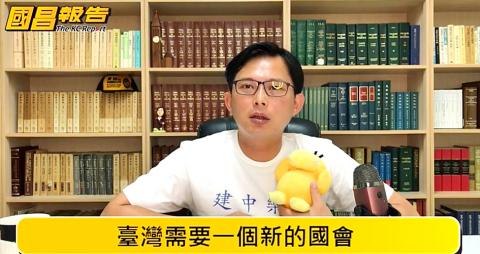Former New Power Party (NPP) chairman Huang Kuo-chang (黃國昌) yesterday said that he would leave the NPP without hesitation if it turned into a “sidekick” to the Democratic Progressive Party (DPP).
Working for the DPP was “not what he wanted to do” in joining the NPP, he said during a livestream yesterday.
The two parties could cooperate if there was an inclusive and impartial platform for doing so, he said.

Screen grab from the Internet
Huang’s broadcast was seemed to respond to media reports that the NPP approached fitness celebrity Holger Chen (陳之漢), seeking to collaborate.
Chen in a live broadcast on Friday confirmed that Huang had approached him about being a legislator-at-large for the NPP, adding that he had declined the offer after giving it some deliberation.
Chen, who runs his own chain of fitness centers, said that he has a responsibility to his shareholders and employees, adding that he feels society “likes people who can lie, rather than those like me who get things done.”
Huang had since the legislative session’s adjournment spoken with a number of experienced people to learn from them and get their feedback, he said yesterday, adding that his three-hour conversation with Chen, in which he had brought up the possibility of a collaboration, had been part of that effort.
Huang said he hoped to gain a better understanding of the type of government needed and where he personally should apply more effort.
The past three years in the legislature has been tiring for him, due to the limited number of NPP seats, he added.
The DPP, with its majority, can approve or shoot down proposals at will, while the NPP can only strengthen its supervisory role, he said, adding that his efforts to keep the DPP in check in the Legislative Yuan have caused some pan-green camp supporters to brand him a “traitor.”
They have told him that he would not have been elected legislator of New Taipei City’s 12th constituency if the DPP had not yielded the position to him, but the DPP never won the city’s Sijhih District (汐止), he said.
Huang said he hoped that the Chinese Nationalist Party (KMT) would not win the presidency next year, and that neither the KMT nor the DPP would win a majority in the legislature, as that would leave the public disappointed again.
“If there is to be something to balance out the two major parties, then the third force [the NPP] needs to grow larger,” he said.
Huang said he would continue to consult with others, and would inform the public when his plans are solidified.

Taiwan has received more than US$70 million in royalties as of the end of last year from developing the F-16V jet as countries worldwide purchase or upgrade to this popular model, government and military officials said on Saturday. Taiwan funded the development of the F-16V jet and ended up the sole investor as other countries withdrew from the program. Now the F-16V is increasingly popular and countries must pay Taiwan a percentage in royalties when they purchase new F-16V aircraft or upgrade older F-16 models. The next five years are expected to be the peak for these royalties, with Taiwan potentially earning

STAY IN YOUR LANE: As the US and Israel attack Iran, the ministry has warned China not to overstep by including Taiwanese citizens in its evacuation orders The Ministry of Foreign Affairs (MOFA) yesterday rebuked a statement by China’s embassy in Israel that it would evacuate Taiwanese holders of Chinese travel documents from Israel amid the latter’s escalating conflict with Iran. Tensions have risen across the Middle East in the wake of US and Israeli airstrikes on Iran beginning Saturday. China subsequently issued an evacuation notice for its citizens. In a news release, the Chinese embassy in Israel said holders of “Taiwan compatriot permits (台胞證)” issued to Taiwanese nationals by Chinese authorities for travel to China — could register for evacuation to Egypt. In Taipei, the ministry yesterday said Taiwan

Taiwan is awaiting official notification from the US regarding the status of the Agreement on Reciprocal Trade (ART) after the US Supreme Court ruled US President Donald Trump's global tariffs unconstitutional. Speaking to reporters before a legislative hearing today, Premier Cho Jung-tai (卓榮泰) said that Taiwan's negotiation team remains focused on ensuring that the bilateral trade deal remains intact despite the legal challenge to Trump's tariff policy. "The US has pledged to notify its trade partners once the subsequent administrative and legal processes are finalized, and that certainly includes Taiwan," Cho said when asked about opposition parties’ doubts that the ART was

If China chose to invade Taiwan tomorrow, it would only have to sever three undersea fiber-optic cable clusters to cause a data blackout, Jason Hsu (許毓仁), a senior fellow at the Hudson Institute and former Chinese Nationalist Party (KMT) legislator, told a US security panel yesterday. In a Taiwan contingency, cable disruption would be one of the earliest preinvasion actions and the signal that escalation had begun, he said, adding that Taiwan’s current cable repair capabilities are insufficient. The US-China Economic and Security Review Commission (USCC) yesterday held a hearing on US-China Competition Under the Sea, with Hsu speaking on